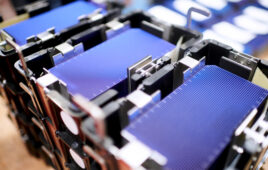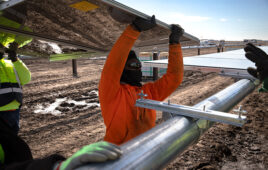After receiving its first U.S. patent last year for its solar manufacturing process, Solar Inventions has been granted new patents in China and Israel and is working on additional global access.
The United States has also issued effective Dec. 13 a “continuation patent” which greatly broadens the claims from the company’s first issued patent, US 11145774, and now includes the most modern cell structures.
Dr. Ben Damiani, a veteran inventor in the solar and semiconductor sectors who previously worked at Suniva and Intel and is now Solar Inventions’ CTO, discovered he could create multiple “lanes” or subcells on a single silicon wafer by electrically dividing each cell during the metalization process. The process requires no capital expenditure or process change from PV cell manufacturers to implement. This technique effectively creates a new architecture that improves cell, module and system performance, while saving up to 18% of the silver required — which contributes to a $2-5 million savings per gigawatt at prevailing silver prices.
“As the solar industry shifts to new cell structures such as TOPCon and HJT and production continues to accelerate around the globe, the economic benefits of our Configurable Current Cell (C3) technology gain importance,” Damiani said. “C3 dramatically increases silver cost savings for solar cell manufacturers, while adding power and resiliency.”
China recently issued patent CN 111868935 for Solar Inventions’ C3 technology, on October 21, 2022. Israel published patent IL 279079 in November, and lacking opposition, will issue it on February 1, 2023. Applications are pending in the European Union and 13 additional countries, including Australia, Brazil, Canada, Egypt, India, Japan, Korea, Mexico, Saudi Arabia, Taiwan, Turkey, United Arab Emirates, and Vietnam, which together account for nearly 90% of the worldwide solar market.
The improved cells and panels can easily be made on existing PV factory lines, without any new equipment or materials. CEO Gregg Freishtat said manufacturers that license the technology will pay only a fraction of the silver savings created thereby guaranteeing increased profit from the very first cell produced using C3.
News item from Solar Inventions





“The improved cells and panels can easily be made on existing PV factory lines, without any new equipment or materials. CEO Gregg Freishtat said manufacturers that license the technology will pay only a fraction of the silver savings created thereby guaranteeing increased profit from the very first cell produced using C3.”
There seems to be a codicil in just about every Engineered solution to a problem. In this case reducing expensive silver as a conductor and interconnect in future solar PV cells. Will these panels be determined unworthy of recycling when they are broken or old? The narrative right now is (all) old and broken solar PV panels go into a landfill. There are more and more solar PV panel recycling businesses popping up each year. So, could solar PV panels with less “mineable” materials become less apt to be recycled but sent to landfills?
Interesting!